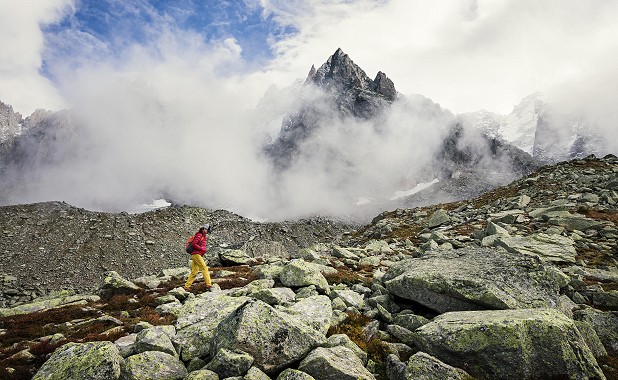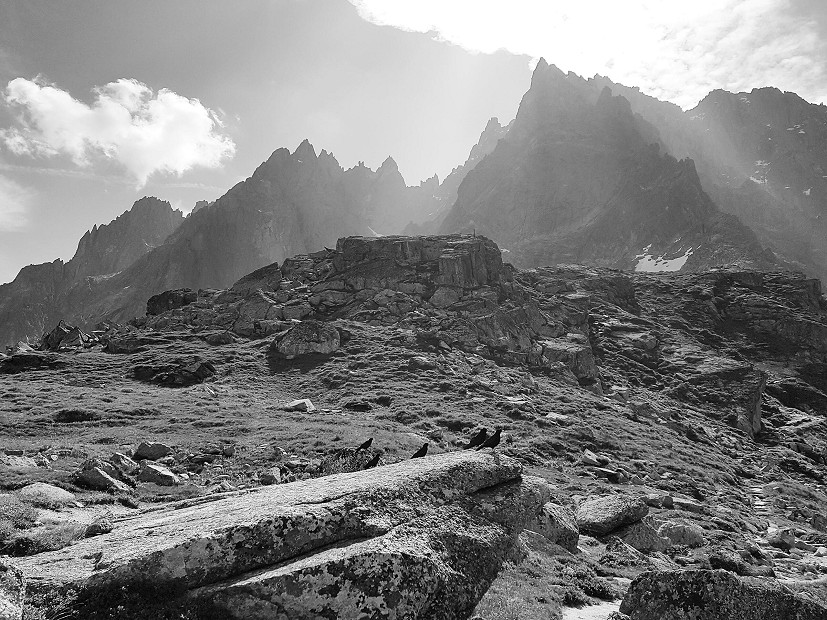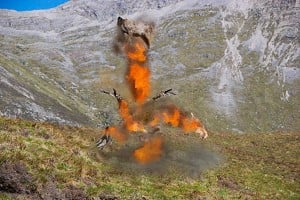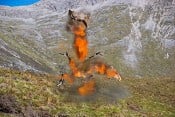
As global leaders meet in Glasgow at the COP26 United Nations Climate Change Conference, UKC and UKH will be sharing our existing climate crisis-related articles and reporting from events in Glasgow. The impact of rising temperatures on sensitive high altitude environments has serious implications for mountain communities around the world, who depend on natural resources for survival — and are ultimately at their mercy when disasters strike.
In his opening address on 31 October, COP26 President Alok Sharma mentioned the impact of climate change on mountain peoples in Nepal, which he witnessed first-hand in February this year.
"On a visit to Jomsom in Nepal, in the Hindu-Kush region, I spoke to communities literally displaced from their homes from a combination of droughts and floods," he said.
This month, ahead of COP26, the International Network of Mountain Indigenous Peoples made a declaration asserting their right to food sovereignty and biocultural heritage, calling upon UNFCCC groups to protect indigenous food systems as a key solution to the climate crisis.
15% of the world's population lives in the mountains – that's more than the entire population of Europe. Between 60% and 80% of the fresh water available on Earth derives from the mountains, and they are home to roughly half of the planet's biodiversity. 1.9 billion people depend on their water resources — more than a quarter of the inhabitants of the entire planet. This capacity for water storage has earned mountains the moniker 'the water towers of the world.'
In August, the IPCC's 6th Assessment Report featured a chapter on the impact of climate change in the mountains for the first time ever. As we struggle to meet the long-term Paris Agreement temperature goal to limit global warming to below 2°C and towards 1.5°C, mountains face elevation-dependent warming, shrinking glaciers, reduced snow cover and changing precipitation patterns, causing knock-on effects for water supply, energy production, ecosystem integrity, agricultural and forestry production and disaster preparedness. These crises come as additional strains to mountain communities already disadvantaged by geographical and political isolation.
Scientists estimate that climate change is affecting major mountain ranges two to three times faster than the rest of the world. One-third of Himalayan glaciers — at the very least — are predicted to disappear by 2100, as temperatures rise at a rate estimated to be up to three times the global average. In the European Alps, the mercury has risen by 2°C over the course of the 20th century – a rise greater than the French average of 1.4°C, and double that of the northern hemisphere. According to one study, if present climatic conditions are maintained, the vanishing Argentière Glacier and the Mer de Glace could both disappear by the end of this century.
Alpine climbers and mountaineers can witness the impact of melting glaciers and the glue-like permafrost which holds mountains together first-hand. Classic routes are crumbling and major rockfalls are becoming increasingly frequent and dangerous. Temperatures are climbing, and snow seasons are shortening. Walkers can't fail to notice the effects of climate change too, even closer to home, in places such as the Cairngorms.
Mountain regions attract about 15-20% of the world's tourism, which highlights a need for sustainable travel in outdoor tourism. As climbers and walkers, many of us struggle with the cognitive dissonance of caring for the environment while also enjoying the convenience of flying thousands of miles across the globe to pursue our hobby. We have shared articles on more eco-friendly travel options, such as travelling to European crags by rail, or locally (or nationally) by bike, while prominent outdoor athletes have enjoyed alternative emission-free adventures by completing multi-route link-ups on two wheels, or even sailing to America.
Over the next two weeks, we will be in Glasgow at The New York Times Climate Hub and other COP26 side events. Stay tuned for reporting on topics related to mountain environments and sustainable travel. In the meantime, here are some links to online events and further information on climate topics.
Two official side events will be held during COP26 within the framework of the UN Mountain Partnership:
- Friday, 5 November 2021 at 18.30-19.45 (UK time): "Sustainable mountain tourism and food systems to support recovery from COVID-19 in mountains" This side event will discuss the role of sustainable tourism and natural resource management for climate change adaptation in mountain regions. Speakers will present concrete experiences of mountain communities' recovery from the COVID-19 crisis and recommendations for long-term sustainable recovery. Webcast link coming soon...
- Thursday, 11 November 2021 at 13.15-14.30 (UK time): "Climate change, mountains and the future of humanity" The event will focus on partnerships and collaboration for building back better from COVID-19 in mountains. It will focus on the role of multi-stakeholder platforms established by governments and NGOs to address issues of international significance. Webcast link coming soon...
- In parallel with COP26, the UN Mountain Partnership is currently hosting a Children's Call to Action to global governments to protect mountain areas, signed by children in mountain communities across the world and open to signatures from others who wish to add their voice to the cause. The petition reads:
'We, children, urge the governments to recognise that: The climate crisis is a child rights crisis, and we want to be active agents of change. We are the current and future custodians of mountains and their natural resources; therefore, improving, supporting and empowering our education and lifelong learning regarding our role in water and mountain conservation in the face of rapidly changing mountain environments and ecosystems is fundamental to addressing the climate crisis. We raise our voices for the organisers of the UNFCCC COP 26 to hear our vision of the Future We Want.'
- Held in the public 'Green Space' and available to watch online, Combining Indigenous Knowledge and Technology to act on the Climate Emergency will take place on 8 November, 14:00 - 15:00. This session explores how one project harnessed local indigenous knowledge combined with technology to create solutions that respond to the climate emergency, enabling people to build safer homes and communities in high mountain areas of Pakistan.
- Also in the 'Green Space' and online, Climate Science at the top of the world – National Geographic and Rolex Perpetual Planet Expeditions will take place on 9 November, 12:30 - 14:00. The session 'brings together science, exploration and storytelling to highlight the impact of climate change on mountain systems and glaciers – and the people who depend on them for water.
- ICIMOD are involved in several events at the Cryosphere Pavilion leading up to the Hindu Kush Himalaya (HKH) Focus Day on 9 November, including an online exhibit. Their aim is to 'promote ambitious climate action for the Hindu Kush Himalaya.' A film premiere of 'Sustainable Summits – Climate Solutions from the Top of the World' and a panel discussion will take place on 7 November from 16:00–21:30 at the Resilience Gala, Glasgow Caledonian University.
- The 'High Summit COP26 - International Conference on Mountains, Climate Change and Sustainable Development' will conclude in wrap-up talks in Glasgow following a two-day conference in Italy in September. Sign up to participate in the livestream and find more information about the summit on the event website.
- The International Cryosphere Climate Initiative is hosting multiple events which will be streamed online, with two days focused on the impact on mountains on 8 and 9 November as part of their COP26 Cryosphere Pavilion. Check their Facebook page for the livestream schedule.
- Protect our Winters are organising marches and online talks. Check their website for information.
Links to mountain climate organisations and initiatives:
IPCC report on High Mountain Areas
International Network of Mountain Indigenous Peoples
Read our UKC/UKH articles on issues relating to climate change and the environment:










Comments
If you are free on saturday 6th november. Why not come to the sheffield cop26 demonstration, meet at 12 on devonshire green and march with 'climbers for climate justice' to rewild the uplands and end grouse shooting for climate change mitigation and natures recovery. Look for the banner and join the march !
I've just added a couple more events that seem to have been added to the Green Space public programme since I checked it last week!